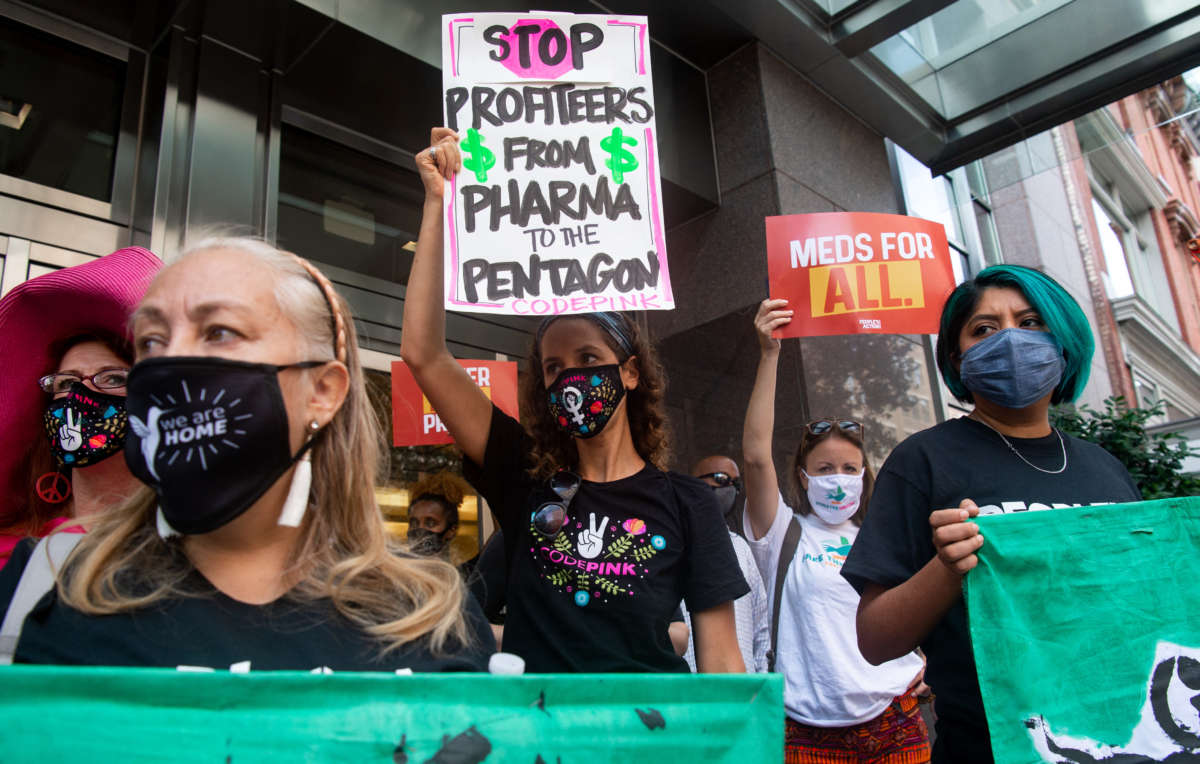Did you know that Truthout is a nonprofit and independently funded by readers like you? If you value what we do, please support our work with a donation.
Major pharmaceutical companies in the U.S. hiked the prices of nearly 870 prescription medications during the first month of the new year as lock-step Republicans and right-wing Democrats — flush with cash from drugmakers — continue to block legislation aimed at reining in the industry.
Through January 20 of this year, according to an analysis released Sunday by Rx Savings Solutions, drugmakers raised the costs of 866 of their products in the U.S. by an average of 6.6%.
“Over the same period last year, drugmakers raised prices by an average of 4.5% on 893 drugs,” observed the Wall Street Journal, which first reported the new study.
“There were some large price increases. AmerisourceBergen Corp.’s Blue Point Laboratories, a seller of generic drugs, more than doubled the price of the cancer chemotherapy drug cisplatin to $30,” the Journal noted. Exelan Pharmaceuticals Inc. raised the price of its generic lisinopril to treat high blood pressure by 536% to a range of $6.17 to $549.85, depending on the dosage and package size.”
The latest data on Big Pharma’s 2022 price hikes drew the attention of members of Congress who are working — in the face of a record-shattering industry lobbying blitz — to pass legislation to curb sky-high drug costs, a problem that’s far worse in the U.S. than in other wealthy countries.
“There is something profoundly wrong in America when a company like Exelan can raise the price of a generic drug to treat high blood pressure (lisinopril) by 536% to as much as $550,” said Sen. Bernie Sanders (I-Vt.), chair of the Senate Budget Committee. “How many more Americans have to die and suffer before Congress has the guts to end this greed?”
Rep. Frank Pallone (D-N.J.), who heads up the House Energy and Commerce Committee, tweeted that “outrageously high prescription drug prices are now even higher as Big Pharma continues its practice of raising prices in January.”
Democrats’ stalled Build Back Better Act contains provisions that would allow Medicare to negotiate the prices of a subset of drugs directly with pharmaceutical companies, something it is currently prohibited from doing under federal law.
The House-passed version of the legislation would also penalize drug companies that raise prices faster than the rate of inflation.
For months, pharmaceutical lobbyists — which outnumber members of Congress on Capitol Hill by a ratio of three to one — have worked aggressively to water down or sink Democrats’ legislation, pouring money into the campaign coffers of friendly lawmakers and spending millions on falsehood-riddled advertising against the Build Back Better package, specifically the Medicare provisions.
The industry’s influence-peddling appeared to have an impact, as a group of Democratic lawmakers in the House threatened in late 2021 to tank the Build Back Better Act over the Medicare price negotiation push. Ultimately, the Democratic leadership settled on a compromise plan favored by Reps. Scott Peters (D-Calif.), Kurt Schrader (D-Ore.), and Kathleen Rice (D-N.Y.), the major industry-backed holdouts.
Sens. Bob Menendez (D-N.J.) is also obstructing more ambitious action to tackle drug prices, which pharmaceutical companies have raised “with abandon” in recent years, according to a recent investigation by the House Committee on Oversight and Reform.
New @OversightDems report finds that allowing Medicare to negotiate lower drug prices could have saved $25 BILLION over a 5 year period.
But instead, everyday Americans bore that cost while big pharma deepened profits.
This is why we need to pass the Build Back Better Act.
— Rep. Barbara Lee (@RepBarbaraLee) December 10, 2021
Kaiser Health News reported in October that as congressional Democrats worked throughout 2021 to craft a drug-price reform plan — aiming to fulfill one of their longstanding campaign promises — the pharmaceutical industry delivered cash to “key lawmakers with surgical precision.”
“Rep. Scott Peters (D-Calif.) received the most money of any member of Congress, with $63,900 in contributions in the first half of the year,” the outlet found. “Next in line was Sen. Robert Menendez (D-N.J.), who accepted $49,300, the most of any senator this year despite not facing reelection until 2024.”
Democrats’ efforts to cap insulin costs in the U.S. also faced intense opposition from the pharmaceutical industry. As STAT reported last week, “Insulin giants Eli Lilly and Novo Nordisk boosted their lobbying spending as Democrats eyed pricing reform.”
In a recent statement demanding passage of the Build Back Better Act by March 1 at the latest, Rep. Pramila Jayapal (D-Wash.) pointed to soaring medicine costs as one of the reasons “the case for this legislation has only become more urgent.”
“Public housing residents have endured devastating fires, the cost of insulin and other prescription drugs continue to crush working people, and parents are desperate for child care support,” said Jayapal. “This desperately needed relief cannot be delayed any longer.”
Holding Trump accountable for his illegal war on Iran
The devastating American and Israeli attacks have killed hundreds of Iranians, and the death toll continues to rise.
As independent media, what we do next matters a lot. It’s up to us to report the truth, demand accountability, and reckon with the consequences of U.S. militarism at this cataclysmic historical moment.
Trump may be an authoritarian, but he is not entirely invulnerable, nor are the elected officials who have given him pass after pass. We cannot let him believe for a second longer that he can get away with something this wildly illegal or recklessly dangerous without accountability.
We ask for your support as we carry out our media resistance to unchecked militarism. Please make a tax-deductible one-time or monthly donation to Truthout.
